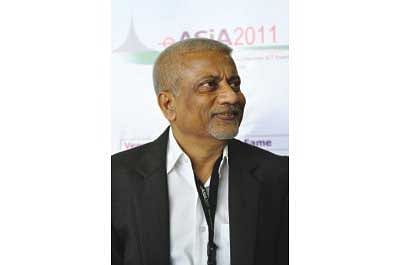Bangladesh needs a 3G vision

Dr Rohan Samarajiva, chief executive officer of LIRNEasia, a Colombo-based think-tank that works to improve the lives of the emerging Asia-Pacific people by facilitating ICT, recently visited Dhaka to participate in the e-Asia event.
On the sidelines of the mega ICT event, The Daily Star had a chance to talk to him on telecoms infrastructure and 3G auction -- topics that have become very important for the telecom industry.
"I don't think anybody could be happy about the infrastructure situation here in Bangladesh. Do you have the platforms for the entrepreneurs that are available in the other countries?" he asked.
He also informed that even Afghanistan is now short listing and evaluating proposals for 3G licensing. Three licences will be given, 10 Megahertz each, and the evaluation process is underway. Where is Bangladesh?
Bangladesh has almost 100 percent telecoms coverage. People have limited income, so data should be available for the people at a lower cost. And that is possible only by 3G or 4G technologies. And for that, Bangladesh needs to lay countrywide fiber optic cables. BTCL (Bangladesh Telecommunications Company Limited) has done that by public money, which is now under the telecom ministry. Everyone should take their help, said Samarajiva.
"If you can use the infrastructure, then you can facilitate the entrepreneurs of the country and can get them on board," he said.
He said the country should have a vision on what connectivity should look like after a certain period.
He said Bangladesh has a bad experience when fixed phone licences were given nationally and regionally without considering necessary resources. They did not have enough frequencies and also had bad business cases, he said. Now, the current licences giving to the mobile companies are more technology specified and restricted than those were given in the 90's.
The BTRC has plans to provide 3G licences by mid next year. He said 3G requires major investment. And the 2G operators have already developed their network all over the country. It will be easier for them to roll out 3G with their existing network. The regulator should consider the business plan when they short list the proposals for auction, Samarajiva said.
He said if a company does not have 2G network, then it is almost impossible for it to roll out 3G.
BTRC is supposed to offer 2G spectrum to the newcomers after 3G auction. Samarajiva said, "I don't see any problem with this. But if the 3G licences are given by auction and 2G given without auction, it will not be transparent."
The government should arrange a workshop to take stakeholders' opinions before going for such decisions.
On whether 3G licences should be given to newcomers or existing operators, Samarajiva said, "There should be a synergy between the technologies. In Afghanistan, three licences will be given but the existing 2G licences have not been shortlisted. This is surprising. And we are investigating it."
In the United Kingdom, five licences were given for 3G and newcomers were also welcomed, which created tremendous pressures for the existing 2G licensees, he said. As a result, the price became high, he added.
"Auctions can result in irrational outcomes, which are called 'winners curse'. After winning the auction, an uncomfortable situation may arise when you may think 'what have I done'!"
In Bangladesh there are two Wimax licences that are still unused and nobody is taking those, he said.
In Hong Kong and New Zealand, 3G auctions were designed on the basis of how much revenue the companies would share with the governments. As a result the company did not give a large amount of money to the government in the first year, but it could give more as the business grows. "Bangladesh can follow the design."
Sri Lanka provided 3G licences to the existing operators at a price of $5 million each.
Samarajiva said auction conditions cannot be changed afterwards. For example, he said, the Indian government at the 3G auction said the companies can provide roaming services among them. But now they are saying that they cannot do it. The government has changed the rule later. "Why was it not prohibited in the beginning, which many countries did?"
When talking about how 3G or any other broadband helps the economy, he said, "Broadband basically helps the economy by increasing the productivity of the workers and enterprises. People can work from anywhere they like when broadband is available. For payment approval, anything can be done from the middle of a road. It increases your knowledge productivity. People can develop various kinds of applications with the support of broadband."

 For all latest news, follow The Daily Star's Google News channel.
For all latest news, follow The Daily Star's Google News channel. 




Comments